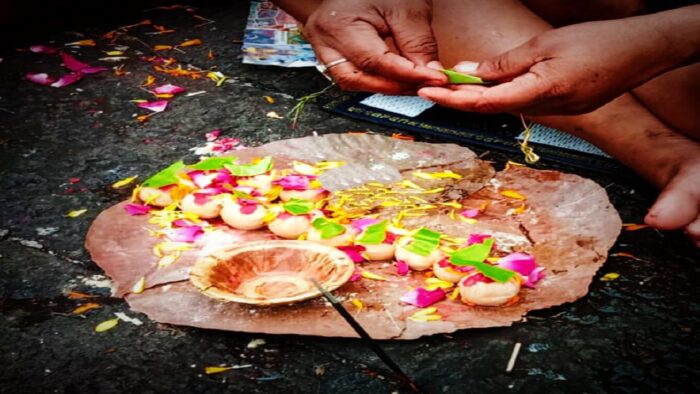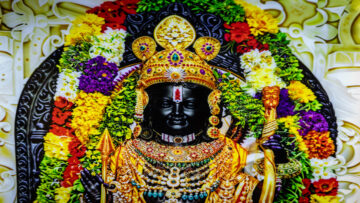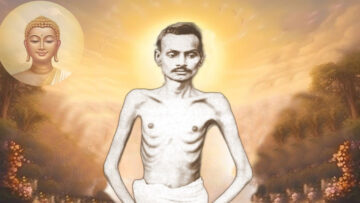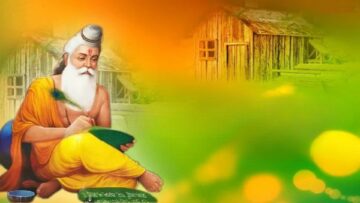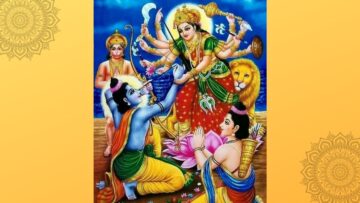Hindu scriptures speak of eighty four lakh classes of beings (yonis). Of these, humans alone are said to reach the city of Yama with their subtle bodies after death, wherein they are either rewarded or chastised according to their karmā. The reward is in the form of a higher birth like a human-being or a God, whereas, the chastisement implies being born as animals, insects, etc. This cycle of birth and death continues until the jīvātmā attains mokṣa.
The scriptures therefore enjoin upon the man certain obligatory duties or śrāddhas for the delectation of his departed ancestors, to whom he is inherently indebted. This debt is said to be repaid by begetting sons, who would in turn continue the performance of the śrāddha to his ancestors in their afterlives. The worship of the ancestors is recognized as one of the Pañca-mahāyajñas or five daily sacrifices to be performed by the twice-born. The importance of the performance of the rites towards one’s ancestors or Pitṛs is unequivocally stated in the Taittirīyopaniṣad as – “देवपितृकार्याभ्यां न प्रमदितव्यम्”, wherein the rites towards one’s ancestors are placed on the same pedestal as the worship of deities.
The term śrāddha generally is explained as “श्रद्धया पितॄनुद्दिश्य विधिना क्रियते यत्कर्म तच्छाद्धम्” i.e. “A rite that is performed faithfully, in accordance with the scriptures for the delectation of the Pitṛs”.
Parāśara gives a more elaborate explanation of the term as –
देशे काले च पात्रे च विधिना हविषा च यत्। तिलैदर्भैश्च मन्त्रैश्च श्राद्धं स्याच्छ्रद्धया युतम्॥
(A śrāddha must be faithfully performed in accordance with the scriptures with the appropriate mantras and oblation, using materials such as sesame seeds and the darbha grass, at the appropriate time at the appropriate place using the prescribed vessels).
A similar explanation is given in the Kūrma-Purāṇa–
“देशे काले च पात्रे च श्रद्धया विधिना च यत्। पितॄनुद्दिश्य विप्रेभ्यो दत्तं श्राद्धमुदाहृतम्”
Śrāddha and its rationale
The jīvātmā transmigrating in its subtle body, is known as preta. The preta, becomes Pitṛ after the sapiṇdikaraṇa rite and thereafter he enters the Pitṛloka. Although the scriptures do not explicitly mention about the duration of the jīvātmā’s stay in the Pitṛloka, they declare that the Vasu, Rudra & Adityas, the Devas who are invoked in the śraddha are responsible for distributing the offerings to the Pitṛs abiding the Pitṛloka or Devaloka or whichever world they are reborn in.
Even if the soul is reborn, by the utterance of the name and the gotra of the deceased with the appropriate mantras and the faith of the performer, the offerings reach the departed soul as his food in whichever world he abides. For example, if the deceased is reborn as a God, the offerings reach him in the form of amṛta, if born as human, then as food, if a serpent, then as wind[1]. The Purāṇas resort to the analogy of a calf identifying its mother in a cattle-shed amidst several cows to illustrate the efficacy of the mantras in reaching the oblation offered by one to his forefathers[2]. The Devas are responsible for the offerings to reach the soul in whichever world he is. They also reward the performer for having appeased his forefathers.
The Purāṇas and the Dharma-śāstras classify the śrāddhas into numerous categories based on their nature. The principal types are the Ekoddiṣṭa (performed with only one piṇda to propitiate a single departed soul), Sapiṇdikaraṇa (performed on the twelfth day of a person’s death to unite the departed soul with his ancestors), Vṛddhi or Nāndīmukha (performed before auspicious occasions such as marriages etc., wherein the forefathers upto three generations extending beyond the great-grandfather are propitiated) and Pārvaṇa (offering three piṇdas to the father, the grandfather and the great-grandfather and invoking the Viśvedevas). Of these the Pārvaṇa-śrāddha involves the worship of the Viśvedevas and the Pitṛs, the pāṇihoma (offering rice in the right hand of the Brāhmaṇa representing the Pitṛs), brāhmaṇa-bhojana and piṇda-pradāna.
As regards the time of performing the śrāddha, texts on rituals enlist as many as ninety six occasions for performing śrāddha such as the twelve Amāvāsyas, the days commemorating the commencement of eons (yugādis), the days commemorating the commencement of Manvantaras, the twelve Sankrāntis (Solar transit), the fifteen days of Mahālayapakṣa, eclipses etc[3],. to name a few, apart from the death anniversary (as per the pañcāṅga). Out of these, one is expected to perform śrāddha at least on two occasions viz, the death anniversary and during the Mahālaya-pakṣa.
Mahālaya-pakṣa and its significance
The fifth fortnight after the month of Āṣādha i.e. the dark fortnight (Kṛṣṇa-pakṣa) of the lunar month of Bhādrapada is known as the Mahālaya-pakṣa or the Pitṛ-pakṣa. This generally coincides with the solar month of Kanyā. Also known as Gaja-cchāyā, it is considered to be the most significant time for the performance of Śrāddha. The Smṛti-muktāphala quotes an ancient authority according to which this is the period when the distressed forefathers long for food and water[4]. The Skanda-Purāṇa asserts that the performance of the śrāddha during the Mahālaya on the tithi of demise of the deceased, bestows upon one, the fruit of performing śrāddha throughout the year[5]. The Prajāpati-Smṛti states that a śrāddha performed during the Mahālaya bestows the most excellent fruits[6]. It is also stated in numerous Purāṇas that the Pitṛs leave the Pitṛloka and descend upon the earth to accept the oblations offered by their descendants and return to their abode on the day of Dīpāvalī[7]. The dark fortnight of the Bhādrapada is known as Mahālaya, since it is regarded as the bode (ālaya) of festivities (maha) as far as the Pitṛs are concerned. The Brahmāṇda and Mārkaṇdeya Purāṇa prescribe the performance of Pārvaṇa Śrāddha during the fifteen days from the entry of the Sun in the Virgo[8]. Hemādri recommends the performance of śrāddha during the fifteen days from the Pañcamī of the bright fortnight of Āśvina till the Pañcamī of the dark fortnight, when the Sun is situated in Virgo, as an alternative period for the performance of the śrāddha, if one is unable to perform the śrāddha during Mahālaya[9]. The Bhaviṣya-Purāṇa mentions Dīpavalī as yet another alternative[10]. However, all texts unanimously mention that the non-performance of śrāddha before the return of the Pitṛs to their realm i.e., the commencement of the solar month of Scorpio (Vṛścika) leads to the displeasure of the Pitṛs and one incurs their curse[11].
The Nirṇaya-Sindhu prescribes offering oblations severally to twelve ancestors (Dvādaśa-daivatya) consisting of the father, the paternal grandfather, the paternal great-grandfather, the mother, the paternal grandmother, the paternal great-grandmother, the maternal grandfather, the maternal great-grandfather, the maternal great-great-grandfather, the maternal grandmother, the maternal great-grandmother and the maternal great-great-grandmother for the Mahālaya-Śrāddha as in case of Gayā-Śraddha.[12] The Dvādaśī of the Pitṛ-pakṣa, known as Yati-Mahālaya is exclusively prescribed for the performance of the śrāddha to a Saṁnyāsī. Yet another significant day is the Avidhavā-Navamī. Śrāddha is performed to women who have predeceased their husbands. It is to be performed till the lifetime of the widower. Some of the texts prescribe feeding a woman with her husband alive and offering her ornaments in addition to feeding a Brāhmaṇa. Although the Mahālaya-śrāddha is expected to be performed with all the rituals of a Pārvaṇa-Śrāddha, the texts also permit the symbolic performance of the śrāddha by means of saṅkalpa[13].
The Brahma-Purāṇa refers to the Mahālaya-pakṣa as the best period to perform Kāmya-śrāddhas i.e. śrāddhas performed to attain specific desires. The Purāṇa enlists the results of performing śrāddha on each tithi of Mahālaya as:
Pratipadā for wealth; Dvitīyā for people, Tṛtīyā for progeny; Caturthī for destruction of enemies;
Pañcamī for securing the grace of Lakṣmī; Ṣaṣṭhī for respect; Saptamī for overlordship;
Aṣṭamī for excellent intellect; Navamī for women; Daśamī for attaining all desires;
Ekādaśī for mastery over the Vedas; Dvādaśī for victory; Trayodaśī for progeny, cattle, wisdom, freedom, long-life etc., Caturdaśī for the redemption of those who have died untimely and unnaturally and Amāvāsyā for attaining all desires and ascending the svarga[14].
The Brahma-Purāṇa equates the performance of the Mahālaya-Śrāddha with performing sacrifices such as Rājasūya and Aśvamedha[15]. The Jābāli-Smṛti refers to the attainment of manifold desires such as progeny, long-life, good health and prosperity by the performance of the Mahālaya-Śrāddha
While the performance of Śrāddha to one’s direct ancestors is enjoined, the scriptures, true to the altruistic nature of Sanātana dharma, also sanction the performance of śrāddha to practically all relatives, one’s Guru, disciples and friends[16]. While the concept of śrāddha is generally understood to be an expression of one’s gratitude to the ancestors and their appeasement, the Purāṇas suggest the idea of universal well-being, the substratum of Hindu practices as rituals being achieved through śrāddhas. The Brahma-Purāṇas says:
यो वा विधानतः श्राद्धं कुर्यात्स्वविभवोचितम्। आब्रह्मस्तम्बपर्यन्तं जगत्प्रीणाति मानवः॥
ब्रह्मेन्द्ररुद्रनास्त्यसूर्यानलसुमारुतान्। विश्वेदेवान् पितृगणान् पर्यग्निमनुजान् पशून्॥
सरीसृपान् पितृगणान् यच्चानद्भूतसज्ञितान्। श्राद्धं श्रद्धान्वितः कुर्वन् प्रीणयत्यखिलं जगत्॥
[He who duly performs śrāddha according to his resources appeases all, right from Brahmā to the twig. He delights Brahma, Rudra, Aśvinas, Agni, Vāyu, Viśvedevas, the animals, the reptiles and others].
The same spirit is echoed in the concluding verse of the Pitṛ-tarpaṇa wherein an individual offers water-libation for the delectation of those who have no kith or kin-
येषां न माता न पिता न बन्धुर्नान्यगोत्रिणः। ते सर्वे तृप्तिमायान्तु मयादत्तैः कुशोदकैः॥
[1] नाममन्त्रास्तथा देशा भवान्तरगतानपि। प्राणिनः प्रीणयन्त्येते तदाहारत्वमागतान्॥
देवो यदि पिता जातः शुभकर्मानुयोगतः। तस्यान्नममृतं भूत्वा देवत्वेऽप्यनुगच्छति॥
मर्त्यत्वे ह्यन्नरूपेण पशुत्वे च तृणं भवेत्। श्राद्धान्नं वायुरूपेण नागत्वेऽप्यनुतिष्ठति॥ (Mārkaṇdeya-Purāṇa)
[2] यथा गोष्ठे प्रणष्टां वै वत्सो विन्देत मातरम्। तथा तं नयते मन्त्रो जन्तुर्यत्रावतिष्ठते॥ (Vāyu-Purāṇa)
[3] अमायुगमनुक्रान्तिधृतिपातमहालयाः। अष्टकाऽन्वष्टकाः पूर्वेद्युः श्राद्धैर्नवतिश्च षट्॥ (Dharma-Sindhu)
[4] आषाढीमवधिं कृत्वा पञ्चमं पक्षमाश्रिताः। काङ्क्षन्ति पितरः क्लिष्टाः अन्नमप्यन्वहं जलम्॥ (Vṛddha-Manu)
कन्यागते सवितरि पितरो याति सत्सुतान्। (Atri-Smṛti)
पिण्डमिच्छन्ति पितरः कन्याराशिगते रवौ। (Brahma-Purāṇa)
[5] आषाढ्याः पंचमे पक्षे कन्यासंस्थे दिवाकरे ॥मृताहनि पुनर्यो वै श्राद्धं दास्यति मानवः ॥
तस्य संवत्सरंयावत्तृप्ताः स्युः पितरो ध्रुवम् ॥ (Skanda-Purāṇa. VI.216.96-97)
[6] श्राद्धान्यनेकशः सन्ति पुराणोक्तानि वैरुचे। फलप्रदानि सर्वाणि तेषामग्रे महालयः॥
[7] यमलोकं परित्यज्य आगता ये महालये। उज्ज्वलज्योतिषा वर्त्म प्रपश्यन्तो व्रजन्तु ते॥ (Dīpāvalī-kṛtya)
[8] कन्यां गते सवितरि दिनानि दश पञ्च च। पार्वणैवेह विधिना श्राद्धं तत्र विधीयते॥
[9] हंसे कन्यासु वर्षास्थे शाकेनापि गृहे वसन्। पञ्चम्योरन्तरे दद्यादुभयोरपि पक्षयोः॥ (Hemādri)
[10] येयं दीपान्विता राजन् ख्याता पञ्चदशी भुवि। तस्यां दद्यान्नचेद्दत्तं पितॄणां वै महालये॥ (Bhaviṣya-Purāṇa)
[11] वृश्चिके समतिक्रान्ते पितरो दैवतैः सह। निः श्वस्य प्रतिगच्छन्ति शापं दत्त्वा सुदुः सहम्। (Brahma-Purāṇa. 220.51)
[12] महालये गयाश्राद्धे वृद्धावन्वष्टकासु च। ज्ञेयं द्वादशदैवत्यं तीर्थे गोष्ठे मघासु च॥ (Nirṇaya-sindhu)
[13] समग्रं यस्तु शक्नोति कर्तुं नैवेह पार्वणम्। अपि सङ्कल्पविधिना काले तस्य विधीयते॥ (Nirṇaya-sindhu)
[14] प्रतिपद्धनलाभाय द्वितीया द्विपदप्रदा।
पुत्रार्थिनी तृतीया तु चतुर्थी शत्रुनासिनी॥
श्रियं प्राप्नोति पञ्चम्यां षष्ठ्यां पूज्यो भवेन्नरः।
गणाधिपत्यं सप्तम्यामष्टम्यां बुद्धिमुत्तमाम्॥
स्त्रियो नवम्यां प्राप्नोति दशम्यां पूर्णकामताम्।
वेदांस्तथाऽऽप्नुयात्सर्वानेकादश्यां क्रियापरः॥
द्वादश्यां जयलाभं च प्राप्नोति पितृपूजकः।
प्रजावृद्धिं पशुं मेधां स्वातन्त्र्यं पुष्टिमुत्तमाम्॥
दीर्घायुरथमैश्वर्यं कुर्वाणस्तु त्रयोदशीम्।
अवाप्नोति न संदेहः श्राद्धं श्रद्धासमन्वितः॥
यथासंभविनाऽन्नेन श्राद्धं श्रद्धासमन्वितः।
युवानः पितरो यस्य मृताः शस्त्रेण वा हताः॥
तेन कार्यं चतुर्दश्यां तेषां तृप्तिमभीप्सता।
श्राद्धं कुर्वन्नमावास्यां यत्नेन पुरुषः शुचिः॥ (Brahma-Purāṇa. 220. 16-22)
[15] क्रतुभिस्तानि तुल्यानि देवो नारायणोऽब्रवीत्।
राजसूयाश्वमेधाभ्यां य इच्छेद्दुर्लभं फलम्॥ (ibid.220. 47)
[16] ताताम्बात्रितयं सपत्नजननी मातामहादित्रयं सस्त्रि स्त्रीतनयादि तातजननीस्वभ्रातरस्तत्स्त्रियः।
ताताम्बाऽऽत्मभगिन्यपत्यधवयुग्जायापिता सद्गुरुः शिष्याप्ताः पितरो महालयविधौ तीर्थे तथा तर्पणे॥ (Nirṇaya-sindhu)
Disclaimer: The opinions expressed in this article belong to the author. Indic Today is neither responsible nor liable for the accuracy, completeness, suitability, or validity of any information in the article.

